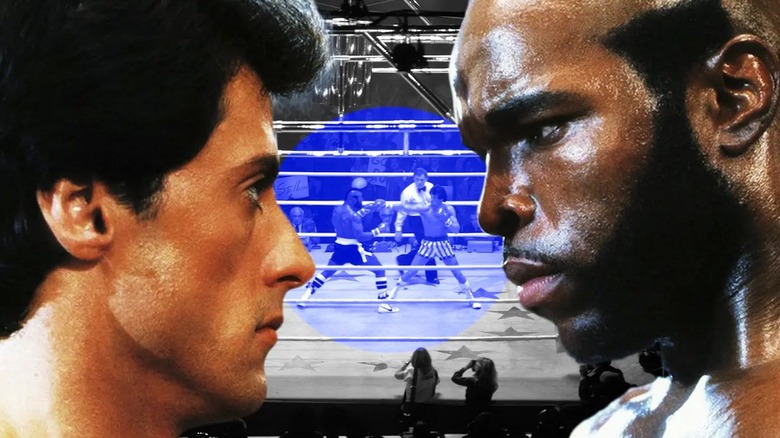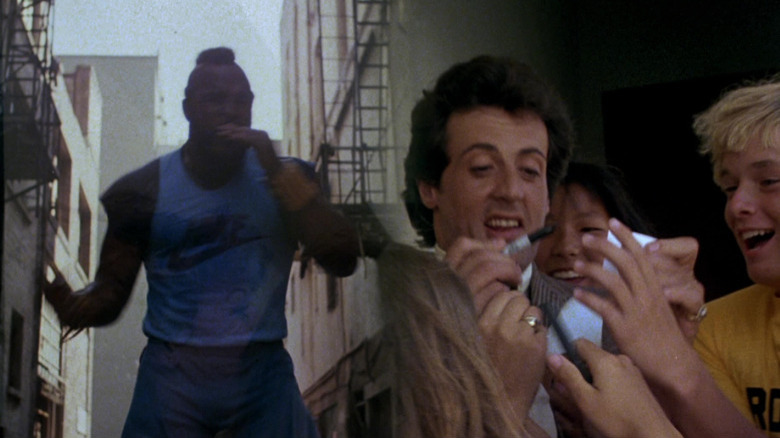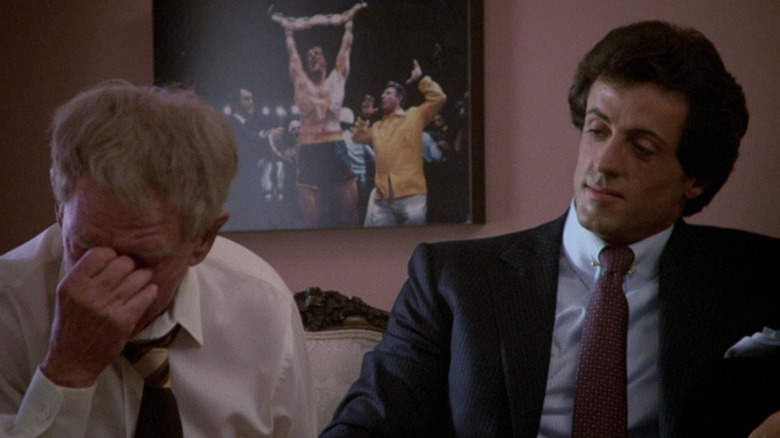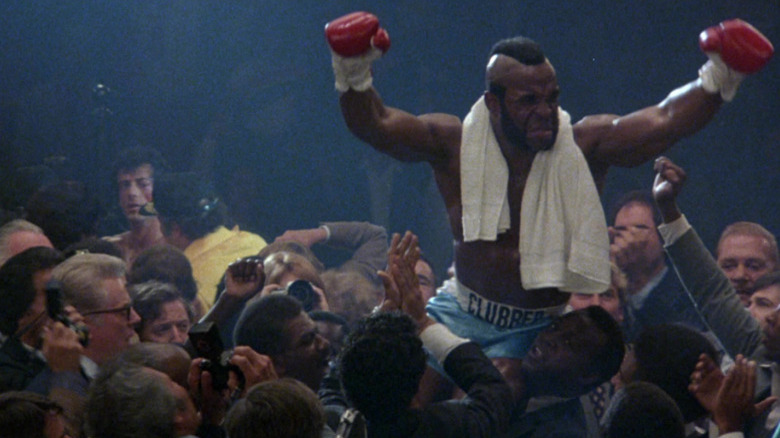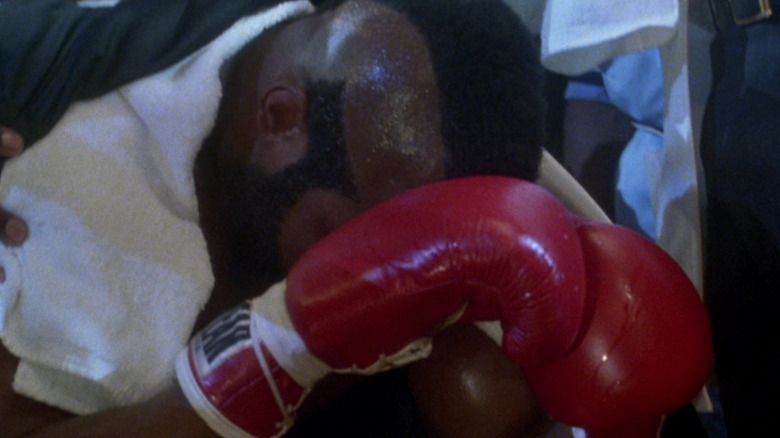Decades Later, It's Clear That Clubber Lang Isn't The Real Villain Of Rocky III
The "Rocky" movies might very well be the best film franchise ever. It's a series of inspirational, character-driven dramas full of unforgettable moments (let's talk about those training montages) and personalities. But if you strip away all the grandeur and the heft, they're all sports movies, and in sports movies, there's a certain simplicity at work. There's gotta be an opponent. And the hero's gotta try to beat them.
So there's a temptation when we talk about stories like "Rocky" to use antiquated, ill-fitting terms. Rocky may be a hero, but he's a flawed hero, and his opponents may be his antagonists, but few could truly be considered "villains." They represent something that Rocky, and eventually his protege Adonis Creed, have to overcome, but with the possible exception of "Rocky IV" the opponents aren't cartoon characters. Even the bad guy in "Rocky IV" eventually got retconned into a more complicated, emotional human being decades later, in "Creed II."
Still, there's one character in the "Rocky" movies that typically gets treated like a villain, all these decades later. He was larger than life, he was full of rage, and it's easy — but not entirely accurate — to accuse him of murdering one of the series' most beloved characters. His name is Clubber Lang, he was played by Mister T, and despite thirty years of misinterpretation, he's not a bad guy. He's not the villain. And although he's Rocky's antagonist, Clubber Lang is absolutely right about almost everything he says.
Clubber Lang wasn't the villain in "Rocky III." He was a misunderstood antihero. And that's why he was able to take down Rocky Balboa. Clubber Lang genuinely deserved to win more than Rocky did, and Rocky knew it.
Clubber Lang was better than Rocky
The original "Rocky" is a classic underdog story about a down-on-his-luck fighter who gets a once-in-a-lifetime, random chance to become the heavyweight champion. Yes, he made the most of it and inspired the nation. But he never technically earned that title shot the way literally every other boxer is supposed to.
"Rocky III" begins with Rocky as the champ. He's spending his time doing charity work, endorsement deals, and fighting boxers who are — as his manager Mickey (Burgess Meredith) later confesses — not as good as Rocky. They didn't take a dive, but they weren't serious contenders. And while everyone else celebrates Rocky's victories, we always see Clubber Lang in the audience, offended by this paper champion. When Rocky gets in the ring with the wrestler Thunderlips and puts on a carnival show, Clubber leaves, visibly disgusted.
So when Clubber confronts Rocky Balboa at the dedication of Rocky's statue and announces to the whole world that Mickey denied him a well-earned title shot, he's being rude, sure, but not evil. "The little man don't wanna come to me," Clubber shouts. "Then I'll come to you people and lay out the truth. I am ranked number one. One! That means I'm the best. But this bum is taking the easy matches, fighting other bums."
And he's 100% right. Clubber earned that title shot and was denied, for no other reason than because Mickey thought Rocky would lose. So if Clubber sounds angry about that, if he's getting in Rocky's face, he's got a damn good reason. Sure, Clubber clearly crosses a line by bringing Adrian, Rocky's wife (Talia Shire) into the publicity stunt, and that doesn't speak well of him, but it's easy to understand why he may have felt that was necessary. Clubber knows Rocky responds to wrestling theatrics, so he makes it personal with over-the-top heel moves.
That whole 'Mickey' thing
Clubber Lang is an angry person. It's a character flaw. He's rude to Rocky, but to Clubber's way of thinking, Rocky deserves it. But he's also rude to Apollo Creed (Carl Weathers) for no particular reason, and he's easily riled by parasitic reporters who refuse to leave him alone before a match when he's literally begging them for privacy.
But the real reason why Clubber comes across as a villain isn't his anger, it's because he shoves Mickey aside in a pre-match argument, and Mickey dies shortly afterward. It's easy to claim Clubber Lang killed Mickey, which would solidify his villain status. But it's a drastic oversimplification of what actually happened, and it lets Rocky off the hook for Mickey's preventable death.
Mickey had a heart condition. It was so severe that even watching the fight between Rocky and Thunderlips made him clutch his chest. Mickey tried to retire afterward, and when Rocky insisted on fighting Clubber Lang, Mickey told him to fight alone. But Rocky ignored his aging manager's obvious distress and insisted they go back in the ring one last time, which placed Mickey in harm's way even if Clubber never touched him.
So yes, Clubber pushes Mickey aside (after Mickey called him an "ape," let's not forget), but it was clearly not an intentional attempt on Mickey's life. It was chaos, spurred by their natural antagonism and reporters making a scene. And then Mickey dies, but only after a doctor takes a (very) long time to get there, and after Mickey refuses to go to a hospital until after the match.
This is important: in the end, after Mickey dies, nobody ever says they have to take down Clubber Lang for killing Mickey. Not once. Rocky and his family don't hold Clubber solely responsible for his part in a complicated situation. Why should we?
Clubber was right about Rocky, and he proved it
That's what it all boils down to, really. Rocky Balboa doesn't view Clubber Lang as a villain. The reason why Clubber Lang is such a powerful opponent goes beyond his obvious talent for boxing, which was already so impressive that he became the heavyweight champion of the world (and rightly so). The reason why he gets under Rocky's skin doesn't even have anything to do, specifically, with Mickey's death.
The reason why Clubber tears Rocky down completely, on a psychological level, is because he's right about Rocky, and Rocky knows it.
Heck, Apollo Creed agrees! Rocky lost his hunger for boxing, his need to prove himself, and has been coasting for so long on celebrity and easy match-ups that he lost what Apollo and the rock band Survivor called the "Eye of the Tiger." He may have been a great guy but he was no longer a great boxer, and the simple fact was that Clubber Lang wanted it more and deserved it more. He might not have been as beloved as Rocky Balboa but unlike Rocky he really did earn his shot and he really did deserve to win.
Until Rocky picked himself back up, confronted his insecurities and learned new strategies, Clubber was the best boxer in the world, even if he was a bit of a grouch.
Clubber Lang deserves better
It's frustrating that with all these legacy "Rocky" and "Creed" movies, which dig back into Rocky's relationships with rivals like Apollo Creed and Ivan Drago, poor Clubber Lang has been shut out completely. His reign was short, but he taught Rocky valuable lessons that the champ later bestowed upon Rocky's own protege. There's hardly any acknowledgement of his existence in the new films, let alone the kind of artistic re-exploration that expands upon his character, which finally gave Drago the shadings he desperately needed to seem like a fully-fleshed out human being (the character is even getting his own spin-off).
Clubber Lang was a force of nature inside the ring and out of it, thanks in no small part to the larger-than-life persona of Mister T, who gives a legitimately great performance. But he gives that performance without the same level of on-screen character development so many of the series' other antagonists get, which almost makes him look superficial. Still, all of his character is right there on the screen, demonstrating the depths of his dignity, the source of his rage, and his obvious loneliness. Unlike Balboa and Creed, who have family and close friends and pep talks and personal lives, all Clubber has is boxing, and he's accomplished everything he's accomplished almost entirely by himself.
"I live alone, and I train alone. I'll win the title alone," Clubber says. He did all of that, and he did it by himself. And he gets absolutely no respect for it. That's a crime.
Maybe he was a jerk. But he wasn't evil, and he wasn't wrong. And he was, for a moment, and very rightly, the greatest in the world.
